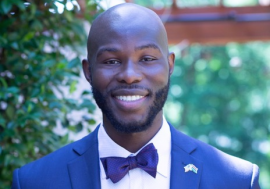Africa Wired
Anti-malaria drug developer wins innovation prize
A ground-breaking anti-malarial drug extracted from a local plant, and a computer software that enables health care workers to determine the appropriate drug treatment for patients with HIV/AIDS, are two of the Innovation Prize for Africa (IPA) award winners selected by a foundation this year.
Dr. Valentin Agon of Benin was selected overall winner, picking up the grand prize of $100,000 from the African Innovation Foundation (AIF) for his drug, Api-Palu, which clears the malaria parasite from the blood quickly and at a relatively low dose.
The drug, significantly cheaper than available antimalarial drugs, is already available in tablets, capsules and syrup, and has been approved for use in Benin, Burkina Faso, the Central African Republic and Chad.
The second prize, worth $25,000, went to Dr. Imogen Wright, a South African scientist, for Exatype, a software solution that can detect which drugs are effective or resistant in cases of patients with HIV.
A growing number of people on antiretroviral medicines are becoming resistant to many of the available drug regimens, leading to failure of the therapy. Exatype uses sequencing of the HIV DNA to determine the drugs to which patients are resistant. The software may also prove useful for other ailments, such as tuberculosis and malaria.
The $25,000 Social Impact Prize went to Eddy Agbo, a Nigerian molecular biotechnologist, for his invention, Urine Test for Malaria, a simple test kit that can detect malaria in less than 30 minutes through a urine analysis rather than the traditional, time-consuming blood smear test.
The IPA annual awardees are selected by the AIF, a UK-based non-profit organisation that spurs innovation and entrepreneurship and ingenuity to further positive change in Africa. It honours individuals who have made advances that enrich the quality of life on the continent. Launched in 2011, the awards focus on home-grown solutions in specific areas of growth and prosperity: health and well-being, agriculture and agribusiness, the manufacturing and service industry, the environment, energy and water and information and communications technologies.
This year’s award ceremony was held in Gaborone, Botswana, in May and honoured 10 finalists out of 985 applicants from 46 African countries.
“In the past five years, I’ve seen innovation grow from a mere buzzword to a sturdy path for African growth in multidisciplinary industries across the continent,” said IPA director Pauline Mujawamariya Koelbl at the awards ceremony. “As Africans, we have the talent, potential and clout to solve our own problems with ingenuity too, and IPA is testimony of this.”
Among the 10 finalists in the health and well-being category, according to IPA, were Kit Vaughn, professor, postdoctoral fellow in orthopaedic engineering and CEO, whose dual-imaging device can be used to perform mammography and ultrasound at the same time, dramatically improving breast cancer detection while using minimal X-rays. Called the Aceso, it conducts exams that consist of a 3-D ultrasound image and a digital X-ray. The process is faster than a typical screening for breast cancer, which includes multiple visits to a doctor for tests that can take more than 30 minutes each. Launched in 2015 at Cape Town’s Groote Schuur Hospital, test trial screening is continuing before the innovation can receive a European Conformity trademark, meaning the device meets the essential EU standards and requirements and can therefore be sold legally.
Godwin Benson from Nigeria developed Tuteria—a peer-to-peer learning online platform that enables students to connect online with someone offering that skill and meet offline for practical exchange.
Samuel Rigu, an agribusiness graduate of the University of Nairobi, Kenya, cofounded Safi Sarvi Organics, a company producing low-cost fertilizer made from organic products and waste from farm harvests.
Youssef Rashed from Egypt developed the Plate Package, a software that can assess the architecture of building plans or technical drawings and determine the structural integrity of the end design, eliminating human error.
André Nel, an electronics and software engineer from South Africa, came up with the Green Tower—a solar off-grid water heating and air conditioning system that reduces electricity consumption by up to 90%.
A mini tractor made from a remodelled motorcycle by Femi Odeleye, an automobile designer from Nigeria, was also a big attraction. With various farming implements attached, the Tryctor can carry out similar operations to a conventional tractor’s on a smaller scale.



















